
Guests
- Michael Mannpresidential distinguished professor in the Department of Earth and Environmental Science at the University of Pennsylvania.
A heat wave is raising temperatures to dangerous levels across much of Europe, just days after a heat wave in North America saw over 3,000 temperature records set. For more, we speak with climate scientist Michael Mann, who warns that heat domes and flooding have nearly tripled since the 1950s. “At some level, this isn’t that complicated. You make the planet hotter, you’re going to have more frequent and intense heat extremes,” says Mann, a professor of environmental science at the University of Pennsylvania. Mann’s upcoming book, co-authored with vaccine expert Dr. Peter Hotez, is Science Under Siege: How to Fight the Five Most Powerful Forces That Threaten Our World.
Transcript
AMY GOODMAN: This is Democracy Now!, democracynow.org. I’m Amy Goodman, with Juan González.
We spend the rest of the hour looking at climate news as a massive heat dome is bringing record temperatures to much of Europe, with forecasters warning of even more extreme heat in the coming days. Spain and Portugal just recorded their hottest-ever June temperatures. Nearly two dozen cities in Italy are under red alert heat advisories. In Turkey, more than 50,000 people have evacuated fast-spreading wildfires. France also saw its first forest fires of the season erupt. This comes after most of North America sweltered under, to say the least, hotter-than-average temperatures in June.
Scientists say the burning of fossil fuels by humans is the primary cause of global warming. This week, the Senate is debating measures to include in Trump’s so-called big, beautiful budget bill, is set to shape U.S. fossil fuel policy in ways expected to accelerate fossil fuel extraction, in part by cutting hundreds of billions of dollars of clean energy incentives — in fact, taxing more clean energy incentives.
This comes as the U.N. special rapporteur on the promotion and protection of human rights in the context of climate change presented a new report Monday on the imperative of defossilizing our economies. This is Elisa Morgera addressing the U.N. Human Rights Council.
ELISA MORGERA: So, what does defossilization mean? It entails prioritizing the phase-out of fossil fuels, including various forms of financing them, within and beyond the energy sector. It means recognizing and prioritizing the phase-out of fossil fuels as the single most impactful health contribution. Defossilization underscores the need to focus on fossil fuels also in connection with the growing production of plastics and petrochemicals, which cause an additional layer of human rights harms and further diminish nature’s contribution to climate regulation and human resilience. Defossilizing our economies then means tackling all the financial benefits the fossil fuel companies are still gaining.
AMY GOODMAN: Morgera also called for a ban on fossil fuel industry lobbying and advertising and urged criminal penalties for those who spread disinformation about the climate crisis.
For more, we’re joined by Michael Mann, the presidential distinguished professor in the Department of Earth and Environmental Science at University of Pennsylvania, director of the Penn Center for Science, Sustainability, and the Media. His most recent research has been profiled in UPenn Today under the headline “Heat domes and flooding have nearly tripled since the ’50s.” His forthcoming book with Dr. Peter Hotez is titled Science Under Siege. His previous books include Our Fragile Moment: How Lessons from Earth’s Past Can Help Us Survive the Climate Crisis.
Welcome back to Democracy Now!, Professor Mann. I was just in Geneva, Switzerland, yesterday. The heat dome was intense. And as we know, in Europe, they don’t have very much air conditioning at all. It’s believed tens of thousands of people have died over the last years in Europe as a result of the intense heat. Can you talk about what you have found around the intensification of, the increase of heat domes, from the U.S. to Europe and beyond?
MICHAEL MANN: Yeah. Thanks, Amy. It’s good to be with you.
And, you know, at some level, this isn’t that complicated. You make the planet hotter, you’re going to have more frequent and intense heat extremes. And we are seeing that. Our climate models capture that, and they predict that that will get much worse in the future if we, you know, as you allude to, continue to burn fossil fuels and warm up the planet.
At the same time, there are some subtle mechanisms when it comes to how the pattern of warming of the planet is changing the Northern Hemisphere jet stream. And some of our own research suggests that that pattern of warming, in particular, the fact that the Arctic is warming faster than the rest of the planet, is actually changing the jet stream in such a way that it’s more likely to get stuck in one of those very wavy patterns that you see on a weather map. And those waves are associated with big high- and low-pressure systems, that alternatively mean heat, drought and wildfires in one place, or excessive floods in other places. Those wiggles in the jet stream are tending to get larger, and they get locked in place, so the same location is under a heat dome day after day, like we’ve seen in North America this summer, like we’re seeing in Europe right now.
And that mechanism is actually not very well captured in the climate models. It’s an important point, because critics of climate policy like to say uncertainty is a reason not to act. It’s just the opposite. Our models may, in fact, be underestimating the impact that climate change is already having when it comes to these damaging and deadly weather extremes.
JUAN GONZÁLEZ: And, Professor Mann, what exactly is a heat dome?
MICHAEL MANN: Yeah, thanks for the question. It’s just an area of very high pressure, very hot, dry air. We’ve seen a number of them out west in recent years. We had one here in Philadelphia. We were under one of those heat domes. We had triple-digit temperatures. And it’s also fairly humid in this part of the country. So, you add those very high temperatures, that excessive humidity, and you’re talking about deadly heat. Here in Philadelphia, we have a very large underserved population of people who are especially susceptible to heat stress. And so, this is a real concern. It’s not a distant concern. It’s something that is impacting us now.
JUAN GONZÁLEZ: And meanwhile, we have the Trump administration not only moving in this new bill to reduce subsidies for solar and wind energy, but also to incentivize coal production, declaring the coal industry critical to the United States. What do you make of this, this direction that the current administration is going in?
MICHAEL MANN: Yeah, it’s tragic. History will not judge them kindly, because at a time when we need to be accelerating the transition away from fossil fuels towards clean energy, they’re doing just the opposite. They’re doing everything they can to block, you know, the continued expansion of wind and solar and geothermal and clean energy solutions. And the rest of the world is moving on. So, what we have to recognize here is that this is — even if you don’t care about the climate, even if you don’t care about the human health consequences, any of that, if you care about the economy, this is the worst possible thing for American competitiveness, because the rest of the world recognizes that clean energy is the future, and right now we’re doubling down on antiquated fossil fuel energy in a way that is making us less and less competitive.
AMY GOODMAN: I want to ask you a quick question, Dr. Mann. This just happened. The U.S. Global Change Research Program’s website, GlobalChange.gov, was taken down, along with information on how global warming is affecting the country. What’s the significance of this?
MICHAEL MANN: Yeah, I actually encountered that yesterday. I couldn’t believe my eyes when I heard that that had happened. And I went to look for those reports, those congressionally mandated National Climate Assessment reports. They’re all gone. You can’t access them online anymore. And the attitude seems to be, on the part of this administration, if we pretend climate change doesn’t exist, if we stop measuring it, if we stop scientists from talking about it and publishing about it, that somehow it’ll just evaporate. It’s such a cynical and dangerous way of looking at this problem.
AMY GOODMAN: I remember when I was growing up, librarians were all saying, “We need paper copies of everything,” as the internet, you know, took over. And I just thought they were so old-fashioned, they couldn’t get used to the idea that the internet was the reservoir of, you know, all global information. But all of this is being wiped away. Let me get your response to podcaster Joe Rogan’s interview with Senator Bernie Sanders. Rogan pushed back when Senator Sanders said, quote, “The last 10 years have been the warmest on Earth.”
SEN. BERNIE SANDERS: There are some people who think climate change is a hoax. It ain’t a hoax. I think the last 10 years have been the warmest on record. And we can create millions of good-paying jobs transforming our energy system away from fossil fuel to energy efficiency, to solar, to wind and other sustainable energies.
JOE ROGAN: I think the climate change issue is very complicated. And I think — did you see The Washington Post piece that they wrote, where they did this long-term view? First of all, the reality is that the Earth’s temperature has never been static, right? We could both agree on that. It’s always been up and down. There’s been ice ages and heat waves. And then, The Washington Post looked at it. What was the time period that they looked at? That, essentially, they found that we’re in a cooling period, that the Earth over the past X amount of years — and this was like a very inconvenient discovery, but they had to report the data, and kudos to them for doing that.
AMY GOODMAN: So, that’s podcaster Joe Rogan interviewing Senator Bernie Sanders. Professor Michael Mann, can you respond? He says — talking about this cooling period.
MICHAEL MANN: Yeah, you know, they say a little bit of knowledge can be a dangerous thing. And here, you know, he probably read a headline, this Washington Post headline, and didn’t even understand the headline, you know, let alone actually read the article. It was about a research article that had been published, I believe, in the journal Nature, which I reviewed at the time and wrote about it. And he got it 180 degrees wrong.
What that article actually showed was, when you look back over tens of millions of years — and I talk about, you know, the lessons from Earth history and what we can learn from them in Our Fragile Moment, and this is related to this article. They’re looking at the changes in climate that have taken place over millions of years, and using a climate model to figure out what it tells us about how sensitive the climate is to increases in CO2. Now, in the past, on hundreds of millions of year timescales, those changes in carbon dioxide are driven by very long-term changes in explosive volcanic activity, which puts carbon dioxide into the atmosphere on timescales of tens of millions of years. I mean, what it shows is that the climate may actually be more sensitive to those increases in CO2. Of course, we are increasing CO2 at a much more rapid rate, a million times faster today. And if anything, what this study shows is that the climate may be more sensitive to this increase in carbon dioxide from human activity today.
So, he didn’t understand what he was reading. He might have heard some talking points from conservative radio or television. And, you know, this is misinformation. Some would call it disinformation, intentional misinformation to mislead the public about what is arguably the greatest threat that we face.
JUAN GONZÁLEZ: And, Professor Mann, your upcoming book, Science — is titled Science Under Siege. The battle over climate change is just part of this war on science of the Trump administration. I’m wondering if you could talk about the impact on your colleagues, on scientists across the United States, as university research is being attacked, as accepted knowledge is being questioned. What this means for the future development of the scientific community in this country?
MICHAEL MANN: Yeah, thanks. You know, the book, in a way, is sadly prophetic, because Peter Hotez, a public health vaccinologist, vaccine scientist, and I began writing this book more than a year ago, and we had no idea what was in store or how relevant it would be to where we are today, because it really is about this dual attack that we’ve seen when it comes to the science behind vaccines and the public health measures necessary to deal with pandemics like COVID-19 or the science of climate change. In both cases, we have seen the science attacked for purely ideological reasons.
And as you allude to, with this current administration, we’re seeing that assault now accelerate in a way that we’ve never seen before, this sort of assault on the science of vaccines and COVID-19, the science of climate. And we’re seeing the defunding of research in this area. We’re seeing researchers attacked and vilified and threatened because of the research that they do, because it’s inconvenient, again, to certain ideological interests who want to see us double down on fossil fuels or who have bought into the idea that, you know, vaccines are a dangerous conspiracy. In both cases, the consequences are deadly. People are losing their lives. And many more people will lose their lives if we continue down this current path of anti-science that we’re going down here in the United States. It’s a very dangerous time for all of us.
And, you know, the irony here is that this is a country that was built on science and technology. And the wonders of, you know, modern life are due to the fact that this country valued scientists, and it promoted and supported scientists for decades. And now, because certain areas of science have become inconvenient, again, to certain ideologically driven individuals and groups and industries, we find science under an attack. You know, again, there’s almost no precedent. You have to go back to, you know, early 1900s —
AMY GOODMAN: Five seconds.
MICHAEL MANN: — Stalin’s Russia, and, you know, the assault on scientists that happened then, to find an analog.
AMY GOODMAN: Michael Mann, we have to leave it there. We want to thank you for being with us from the University of Pennsylvania. I’m Amy Goodman, with Juan González.

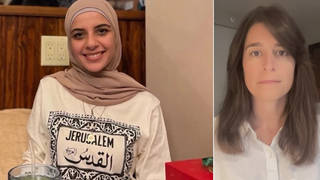
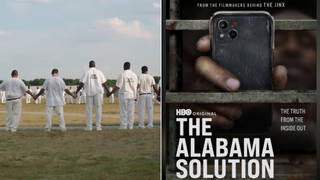
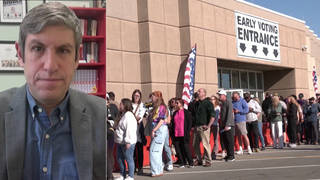
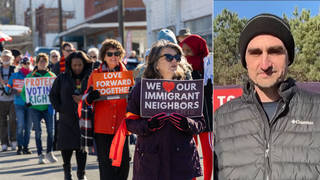







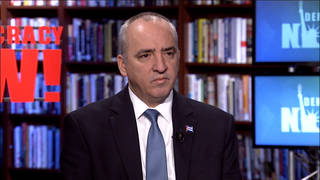
Media Options